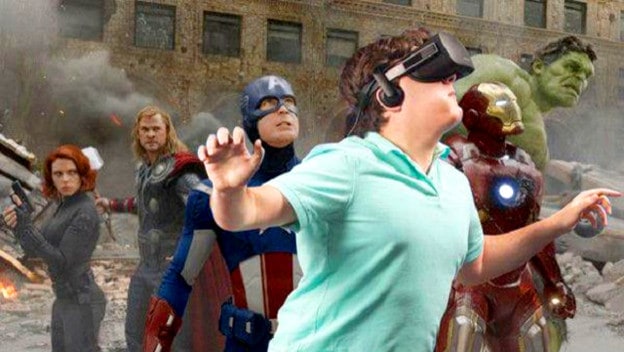I hate to be a party pooper, I really do. It’s just that we’ve had so many ebullient articles here on Cheat Code about gaming’s glorious virtual reality-based future that I feel obliged to play the grumpy old lady for a bit. I’m excited for VR and, since I haven’t had a chance to really try it out yet, am looking forward to doing so. However, I’m also skeptical. There are several important questions about how virtual reality will be received by the public, and we’re not going to have the answers until VR sets become more commonplace. Let’s take a look at them.
1. Do we want total immersion? That’s my first, and I believe most important question about VR. The gaming population is aging, with tons of core gamers in their thirties and forties these days. As a gamer who also works from home, I often hesitate to even wear headphones. I need to hear the phone ring, pay attention to my texts and instant message beeps, and listen to make sure my Maine Coon kitten of doom isn’t destroying anything… and I’m not even a parent! I don’t see too many situations in which parents, especially those with young children, are going to want to be encased in VR gear and unable to fully keep track of what’s going on around them. This reason alone limits the adoption and long-term use of VR headsets.
How many people can successfully experience VR? Here’s a problem that hit the 3DS hard in its early days. Not everybody can successfully see the 3D effect, and some people who can see it find it dizzying and uncomfortable. How many early VR adopters will find that they can’t successfully enjoy the experience? Like the 3DS display, today’s VR displays are stereoscopic, so I assume that people who are stereo-blind (suffering from one of numerous vision issues) won’t be able to use the current crop of VR headsets either. People who have trouble with stereoscopic displays are not an insignificant percentage of our society – I bet all of you have at least one friend or family member who can’t or won’t go see movies in 3D. I have several. These folks aren’t going to do well with VR either.
How many kinds of games are best experienced in VR? This was a big problem for the motion control trend. Everything seemed bright and sunny at first as Wii Sports, various minigame compilations, and dance/fitness games took off like crazy. Soon, though, it became obvious that many types of games aren’t best steered by motion controls, and the whole thing became a fad left in the dust of the Wii’s heyday. Could the same thing happen to VR? I do think a wider variety of game types will translate well to this new gaming environment, but not all of them. For health and safety reasons, VR is not currently suited for long gaming sessions, making it of limited use to fans of some of the most popular genres like competitive FPS games and RPGs. In addition, you don’t always want to be surrounded by your gaming environment, depending on the type of game you’re playing and how it controls. I don’t see traditional RTS games like Starcraft , for example, working well in VR, and various kinds of puzzle games work best when you can view the screen from a distance. The long-term success of VR will depend on how well developers can convince us that our favorite games are most enjoyable in VR, and it might require a few more hardware generations to allow us to keep the headsets on longer.

Can VR hurt us? The most common health concerns about virtual reality are eye damage and neurological damage. We frankly don’t know enough to be able to confirm whether responsible use of VR headsets can cause permanent harm, but there are concerns , especially when it comes to extended VR sessions (which are currently not encouraged by the headset manufacturers). Science people are doing science (yay!) around the way our eyes work when viewing virtual environments, and there are definitely still problems that won’t be solved by the upcoming sets. What I find even more interesting, though, is an issue brought up at this year’s GDC. Horror is one promising genre for VR, but if it’s too immediate or immersive, it could trigger our fight or flight mechanisms, and that can be dangerous. If somebody has a heart attack while playing a horror VR game, that would create some very bad press.
There are a lot of things to be excited about with virtual reality, but there are a lot of questions, too. Depending on how much developers embrace it and how consumers take to the technology, this year’s VR headsets could be the start of a new frontier in gaming or merely a passing fad, doomed to be the last headsets we see for some time until the technology improves once again. I’m hoping for the former, but I’m quite curious what will come of all these questions.
Intro Image Credit: TIME Magazine VR Cover, Andrew Horn
